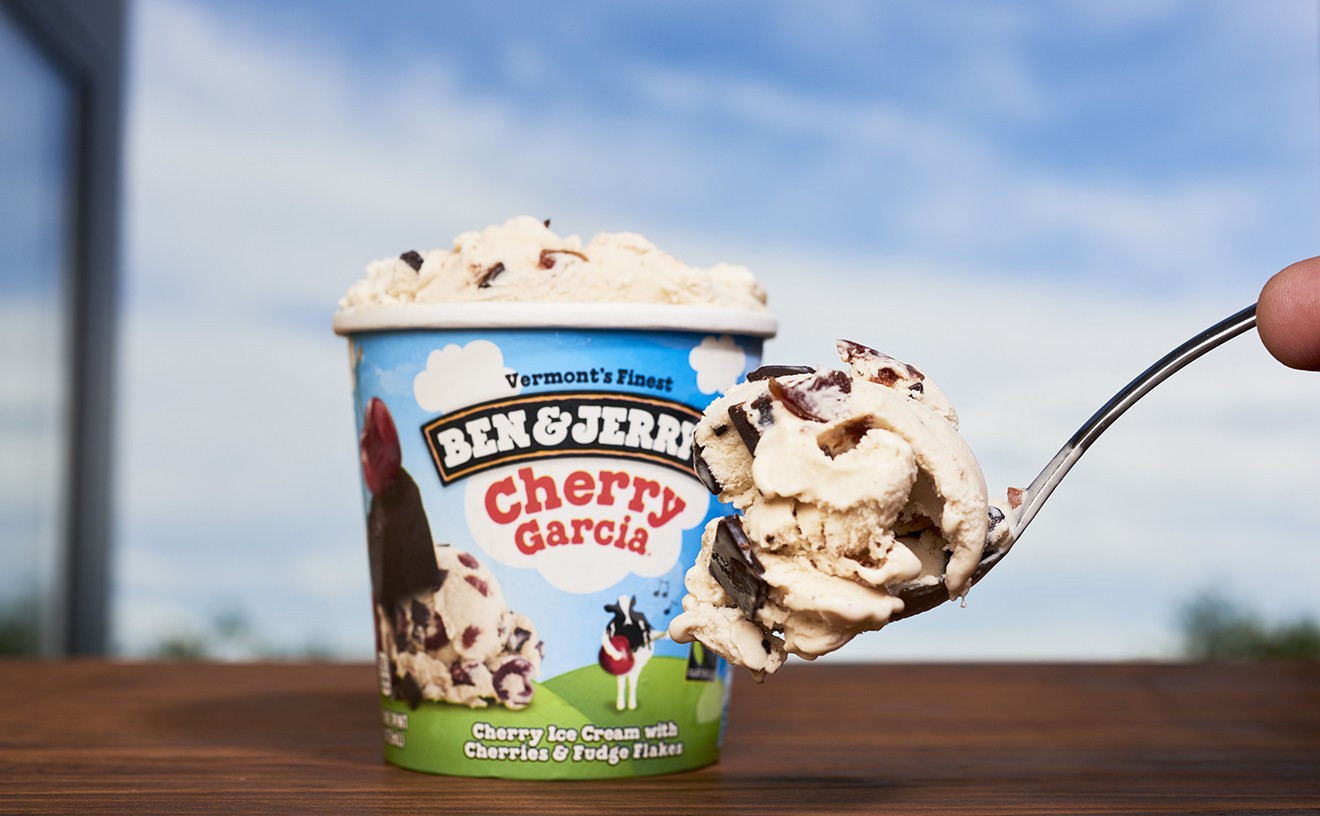There is no one sandwich that reigns supreme in Dallas, something that just isn't true of other cities. As such, our fair city has played host to a variety of sandwich concepts that have attempted to elevate the ham sandwich you eat for lunch every third day. Some have been more successful than others, but there is a growing crop of restaurateurs hoping to cash in on upscale, refined sandwiches.
For East Hampton Sandwich Company's Hunter Pond, that risk has paid off beautifully. Just one year after opening his first shop in Snider Plaza, the 27-year-old Pond has already planned multiple new locations of his restaurant for Dallas, along with being named one of Forbes magazine's "30 Under 30," an award given to innovative young entrepreneurs.
I sat down to talk with Pond about receiving such a prestigious award, the challenges of opening a restaurant as a baby-faced 25-year-old, and how he's managed to make East Hampton one of Dallas' biggest restaurant successes of 2014.
Congratulations are clearly in order. You were just named one of Forbes' top 30 entrepreneurs under age 30. Did you see that coming? No way. Forbes reached out to our PR company a few months ago, but never mentioned anything about me. When the article came out, I got a random phone call from them letting me know. After it came out, Twitter started going crazy and I started getting emails from everyone I know. It's crazy.
How did that feel, though? It has to feel good to be rewarded in such a big way for all your hard work. At first I was really embarrassed. I'm not really a person who thrives on attention, and after it sunk in, I just got used to the congratulations. Not to be cheesy, but I was pretty grateful. I called my parents, my wife, and my business partner Will, and just sort of enjoyed the moment with them. I had to say thank you to everybody. It's a big deal, but I didn't want it to be a spotlight on me. I started this company, but there have been many people who have played huge roles in getting it to where it needed to be. I wanted to make sure I was appreciative of that.
Do you feel like the award brings with it a lot of pressure to be even more successful? I guess so. I've been more in the zone at work in the past couple of days, because I'm on the big stage. I can't screw up now.
You didn't go to culinary school or have any interest in being a chef. What exactly it was about opening up a restaurant appealed to you?
I always knew I wanted to be in business for myself. My dad started his own company at a young age, and I knew it was what I wanted to do. I majored in Business Entrepreneurship at Texas Tech and when I left, the economy was terrible. We were in the recession, and everyone was struggling to find a job. I really wasn't interested in getting into real estate or oil and gas, or just avoid the hiring situation altogether and go back to school. I took the LSAT, and my parents were really into me being an attorney.
I wanted to get my law degree and go into business, using it as a tool. I did well on the LSAT, and then they told me I had to pay for my own law school. I went to St. Mary's in San Antonio because they're the ones who gave me a scholarship. I lasted one semester, took a few exams, and realized that I despised law school. I didn't want to be an attorney. If I was going to figure out how to be my own boss, I knew I had to jump in and just do it. I did have a passion for food and a passion for cooking, but I also appreciated the reputation the restaurant industry has for being really difficult. If I succeeded, it was something that I could be really proud of. So I said screw it, and went for it. I dropped out, got a U-Haul, and moved back to Dallas.
Going from a law school dropout to the Forbes "30 Under 30" list for opening a restaurant is a pretty quick trajectory, especially for someone who didn't want to do the cooking. My approach to the restaurant business is unique, I think. I didn't have any experience in a kitchen other than working at Eno's Pizza for a little while. The menu at East Hampton was composed by me sitting in front of my computer and figuring out what I wanted to serve. Then, I hired a chef and we really worked through the recipes together. There were so many things in this process that I just didn't know how to do, and I think one of my personal strengths is being able to admit that. That's what I did with the recipes. Even though I wrote the menu, I still didn't know how to make ten gallons of jalapeno cream sauce every morning.
When you are starting your own restaurant, it has to be hard to set the ego aside and let your chef do their thing. What about that relationship with your chef work? We bootstrapped everything. I'm thinking back to the very beginning stages of the restaurant, and it was such a shit-show. It was incredible, really. The most honest answer I can give is that we just worked our asses off and did everything together. We would sit there and come up with the recipes all day, but we had to figure out how to keep up with prep when the line was snaking out around the door. We were just there, a lot. There was a lot to do, but once we transitioned the recipes to scale, we really didn't have to mess with them further. Once we knew it, we knew it.
Why, out of all the restaurant concepts in the world, did you choose a sandwich shop? The core of East Hampton is filling the void between Jimmy John's and getting a really decadent sandwich at an upscale American grill like Houston's or Nick & Sam's. We're not a standard sub sandwich shop, and we're capitalizing on this void in the marketplace. That was the idea behind East Hampton. There needed to be a place where you could find 10 or 12 completely different sandwiches that were really refined.
What about the name "East Hampton" was significant to you? Do you have some kind of connection to The Hamptons that made you want to name your restaurant after the area? Slightly, I guess. I went there as a little kid, but the main reason I chose the name East Hampton Sandwich Company is because I wanted something that elevated the expectations for customers before they even walked in the door. I thought of a bunch of different names that had no meaning, like Street Side Sandwich or something, but they didn't really set an expectation for what the restaurant would do. The Hamptons immediately came to mind as a place that was super bright, clean, and fresh. When you think of the Hamptons, you think high quality. And that's what our sandwiches are. They're just a little bit better than regular sub chains. The image of sandwiches isn't as luxe as you're describing, I don't think. Is there something about a sandwich that people just don't associate with high-quality food? The view of sandwiches is changing dramatically. Do I think this concept would have worked twenty years ago? No. But the new generation that is coming through has disposable income, and they are way more open to having a high-quality sandwich for dinner. The same goes for young families. We are a huge family destination and sell a ridiculous amount of kid's meals. We try to make it feel like people are eating at an upscale restaurant, not a sandwich shop. I hate the phrase "sandwich shop." I prefer "sandwich restaurant."
Dallas doesn't have a sandwich culture that you see in places like New York City or Philly. They have these really iconic sandwiches, and Dallas just doesn't have that. If we were to have a signature sandwich, what would it be?
I think it's iconic that Dallas doesn't have a specific sandwich. Dallas is such a melting pot, and our identity is more cosmopolitan than others in the state. It might be a relatively new thing, though. Our clientele is people who are constantly looking to try something new, people who are open-minded. It's kind of ironic that I say that because the first location is in one of the most old-school areas of Dallas, which comes with its own set of stereotypes and expectations. But as we open new locations, I see that our clientele is foodies. They're people who truly value what they expect from a sandwich.
We're 10 to 15 percent more expensive than a place like Jersey Mike's, but the people that we want coming into East Hampton are the people who appreciate the quality that comes with that small boost in price. It's so much better, and it's so much better for you. We use the hashtag #nomoredelimeat, and that's what rings the most true about East Hampton over anything else. Do you know how gross deli meat can be? It's really bad. People who value what they put into their bodies realize that, and they're the ones who come and dine with us. That culture in Dallas is only going to continue to grow.
It's interesting that the price is only 10 percent or 15 percent higher than fast-food sandwich shops, because the level of quality really is different. Is it difficult to stay within that price point with such a huge quality gap? Our business model means that we eat a little bit on food costs. Our food cost is a little higher than industry average, but we make up for it in volume. That was kind of a big risk to take on the first restaurant, but it worked out beautifully for us.
What is your day-to-day involvement in the restaurant? Now that it's got its footing, what do you spend your time as owner doing? I'm not in one restaurant in particular every single day, at least not right now. I spend the majority of my days working with operations managers, or I'm working with my partner in our office on the business side of things. I'm overseeing accounting, new growth, and everything. Restaurants are famous for having so many moving parts, and making sure that it all runs smoothly is my job.
What about that business do you enjoy most? What task or part of running East Hampton Sandwich Company is your favorite part? I love having the freedom to build something from scratch, and not having to answer to a boss or anyone else. But of my job specifically, in running my restaurants, seeing lines at the door is always my favorite part. I also really enjoy the real estate aspect of the business. I love going with my business partner to scope out really good locations, talking to landlords, and conceptualizing new locations. The menu is set, our team is in a groove, and growing this company will probably always be the best part of my day.
You're already expanding in Dallas. Do you have plans to take the restaurant to other cities? I don't want to be the next Chipotle. I don't have grand aspirations to take over the sandwich world, but as long as we continue to see a void in the marketplace, we're going to work as hard as possible to fill it. We believe in our product that much, and we think our customers do too. As long as the sandwiches continue to be popular and people keep showing up to eat our sandwiches, we're going to bring it. We're looking at markets outside of Dallas that we think will do well.
Do you find that it's hard to get respect as a baby-faced young guy who is new to this business? Look at me. I look like I'm 24. I still get carded everywhere I go, and I do blame the way I look sometimes on the way that people act toward me. If people have done their due diligence on me, they're usually surprised at how young I look. When I introduce myself, people are sometimes surprised that I'm Hunter Pond. It was a huge hill to climb in the beginning, especially when I was raising the money.
There was a lot of people just not giving me a chance. They wouldn't even consider my idea or take a look at my business plan, because they heard "restaurant business," the biggest risk of all, and because they saw a 25-year-old kid standing in front of them. It was really tough, but I didn't stop.
What do you attribute that tenaciousness to? Leaving law school and knowing that I had to make this shit work.
Let's pretend for a second that the opening of East Hampton hadn't gone as well as it has. Would you still be trying in the restaurant business? That's a tough question. If the original restaurant hadn't worked out, I definitely think I would have hung in. I guess it depends on how quickly it failed. If it failed within the first month, I might have seen that it wasn't a great idea. I was so green, though, and I needed to have experience to know whether or not I could cut it in the industry. If we died out after a year, maybe I would have kept trying again in a different location. But I'm glad it didn't work out that way.
What do you think it takes to be successful in this business? From a business owner's standpoint, I think it's incredibly important to have a business background. If you can't do basic accounting, you probably won't be successful. You have to be able to recognize your own ineptitude, too. When I was starting out, I would outsource things that I didn't feel comfortable handling to my business partner, and he crushed it. When I realized that I couldn't build these recipes to scale, I found a chef with a good operational background that could help me.
There are so many things going on in opening a restaurant. This is an industry of pennies. You might think that you have everything under control, and something like the type of salt grinder that you're putting on the tables could tank your food costs. That was the hardest thing for me to really grasp. My business education was from such a macro perspective, diving into the minutiae of East Hampton was really hard. I couldn't comprehend how much those tiny things factored into whether or not the restaurant was successful.
How did you avoid spending yourself to death, especially when you're taking a hit on the food cost and promising elevated quality?
I did. When we first opened, we had some time to figure out our food cost because we had the volume. It gave us a little wiggle room. We learned pretty quickly, and that's what has led to this business being so profitable. We were forgiven for a lot of mistakes early on, but even with some operational missteps, we were profitable in our first month. Even given all the crap that goes down in opening a restaurant, we were making money.










